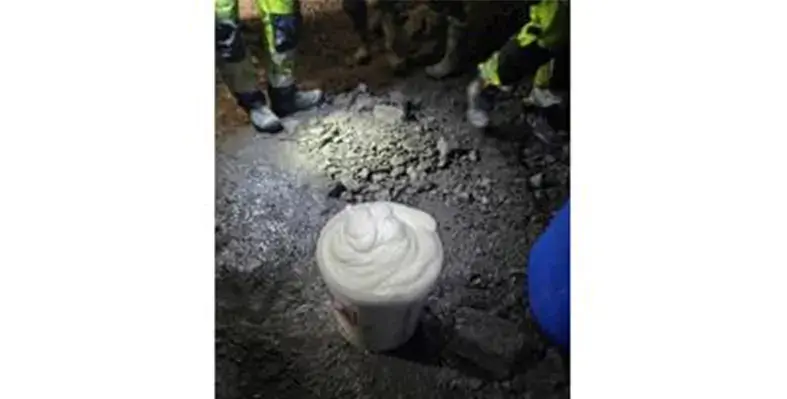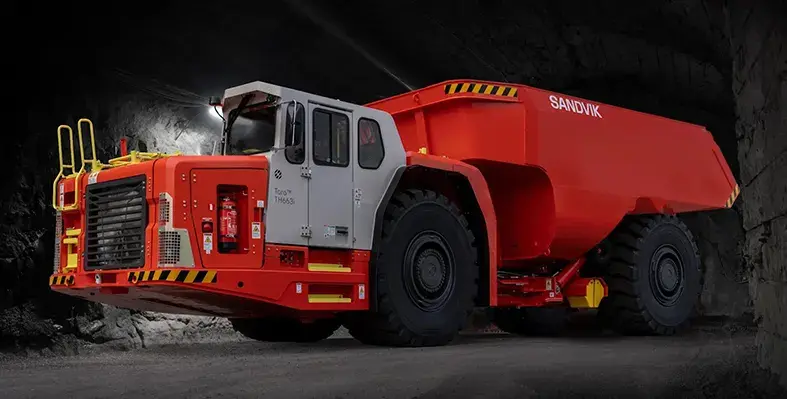
The new partnership will aid the shift to more sustainable mining in the SADC region (Image source: Hypex Bio)

The new partnership will aid the shift to more sustainable mining in the SADC region (Image source: Hypex Bio)

Sandvik to supply 32 underground units to support JCHX at MMG’s expanding Khoemacau Copper Mine in Botswana. (Image source: Sandvik)
JCHX Mining Management Co., Ltd., a global mining contractor headquartered in China, has awarded a significant equipment supply contract to Sandvik Mining
The agreement involves the delivery of a 32-unit underground mining equipment fleet to support operations at MMG's Khoemacau Copper Mine (KCM) in Botswana.
The order, confirmed in Q3 2025, includes a diverse and high-capacity fleet: 12 Toro TH663i trucks, 10 Toro LH621i loaders, eight Sandvik DD422i development drills, one Sandvik DL432i longhole drill, and one Sandvik Rhino 100 raise borer. Additionally, the contract incorporates Remote Monitoring Service to deliver critical operational data aimed at optimizing fleet performance. Equipment deliveries are scheduled to commence in Q3 2025 and will continue through Q2 2026.
“We are proud to partner with JCHX in delivering safe and productive operations at Khoemacau Copper Mine,” said Mats Eriksson, president of Sandvik Mining. “Our advanced underground technologies and digital solutions will help enable efficiency and performance as the site ramps up production in the coming years.”
Situated in Botswana’s Kalahari Copper Belt, Khoemacau Copper Mine is a significant underground mining operation currently undergoing major expansion. Since acquiring the mine in March 2024, operator MMG has advanced its development plans, aiming to boost annual copper production to 60,000 tonnes within two years. This goal will be supported by the existing 3.65 Mtpa process plant, with improved access to higher-grade ore zones enhancing operational flexibility and output.
Looking ahead, MMG plans to further scale up copper production to 130,000 tonnes per year by constructing a new 4.5 Mtpa processing plant. This long-term strategy includes expanding Zone 5 production and developing nearby deposits. Early-stage works for the expansion are already underway, with full construction expected to begin in 2026 and first concentrate production targeted for 2028.
“We’re proud to partner with Sandvik for this important contract,” said Xiancheng Wang, chairman of JCHX Mining Management Group. “Sandvik’s reputation for high-performance equipment and strong aftermarket support was key in our decision. This fleet will play a vital role in helping us deliver operational excellence and meet the ambitious production targets set for the Khoemacau site.”
JCHX Mining Management Co., Ltd. is a publicly listed company on the Shanghai Stock Exchange, boasting nearly 30 years of global mining experience. The company employs more than 16,000 people worldwide, including 8,000 across Africa, and provides contract mining, engineering, and mine construction services across multiple continents.
A year after Pilbara Minerals commissioned the world’s largest lithium ore sorting plant in Australia, TOMRA Mining’s sensor-based sorting technology is delivering measurable value — with clear significance for the Africa market
The technology is now delivering measurable value at the Pilgangoora Operation in Western Australia, contributing to the strongest quarterly production of FY25, significantly reduced costs and enhanced resource utilisation.
As investors get to grips with Africa’s strategic importance in critical minerals, including lithium, the search is on for effective, powerful solutions and innovations that can streamline and boost productivity.
Powered by TOMRA Mining’s advanced sensor-based sorting technology, the Pilgangoora Operation has achieved impressive results, boosting production, reducing costs and unlocking value from previously uneconomical ore.
In its June Quarter FY25 results, Pilbara Minerals reported a 77% increase in production volume and a 10% reduction in unit operating costs (FOB) compared to the previous quarter.
These gains stem from the ramp-up of the P1000 expansion and the integration of TOMRA Mining’s cutting-edge sorting technology.
“The June Quarter marked the strongest performance of the year, clearly demonstrating the impact that TOMRA’s technology can deliver at scale,” said Gavin Rech, area sales and technical manager Australia at TOMRA Mining.
“By unlocking value from lower-grade contact ore previously considered uneconomical, the operation now accesses more lithia units from the pit, enhancing resource utilisation and mine flexibility.”
Commissioned in August 2024 as part of the P680 Expansion Project, the crushing and sorting plant is the largest lithium ore sorting facility in the world, with a capacity of more than 1,000 tonnes per hour.
TOMRA Mining’s sensor-based technology enables early waste rejection, significantly improving lithium recovery and final product quality while reducing energy consumption and environmental impact.
The sorting plant successfully addresses a key challenge in lithium mining: managing spodumene ore within barren host rock.
It includes 10 high-precision TOMRA sorters – four TOMRA COM Tertiary XRT for fines, three TOMRA COM XRT 2.0 for mid-sized particles, and three TOMRA PRO Primary Color for coarse-sized particles.
By removing barren material upstream, the plant enhances the efficiency of downstream processes, reduces energy use by 8–15 GWh annually, and ensures consistent product quality.
This success is the result of several years of collaboration between TOMRA Mining, Pilbara Minerals and engineering partner DRA Global.
The project was delivered on time and on budget, following extensive testwork at TOMRA’s Sydney Test Centre that demonstrated the technology’s capability to deliver high lithium recovery and effective waste separation across varied ore domains.
This strategic choice also supports Pilbara Minerals’ long-term goals of cost optimisation and sustainable growth.
The ore sorting facility boosts Pilgangoora’s production capacity and lays the foundation for future expansions under the P2000 project.
As the lithium market evolves, the company is well-positioned to lead through innovation and resilience.
With the P1000 expansion now complete and the P2000 feasibility study underway, TOMRA Mining’s proven technology and industry-leading expertise continue to support Pilbara Minerals’ long-term strategy for scalable, cost-efficient and responsible lithium production.
Read more:
Record-breaking diamonds recovered with TOMRA technology
A giant leap forward in sensor-based sorting
TOMRA RXT technology exceeds expectations at magnesite deposit
In a decisive move to tackle the challenges of illicit gold trade and formalise its artisanal mining sector, Côte d’Ivoire has partnered with the World Bank and the World Gold Council in a new initiative aimed at transforming small-scale gold mining into a safer, more transparent, and economically beneficial industry
The Multistakeholder Partnership for Sustainable and Responsible Small-Scale Mining (MSPI), launched today, brings together major players including Endeavor Mining, Perseus Mining, and the Chamber of Mines of Côte d’Ivoire. The initiative seeks to integrate artisanal and small-scale miners into a regulated, traceable gold supply chain.
“Côte d’Ivoire is leading the way in transforming artisanal and small-scale mining into a more professional, regulated sector,” said Mamadou Sangafowa-Coulibaly, minister of mines, petroleum, and energy of Côte d’Ivoire. He described the partnership as a “crucial step” toward making small-scale mining “safer, more transparent, and a driver of development, growth, and job creation.”
The reform comes in response to the sector’s longstanding issues with smuggling, environmental degradation, and weak regulation. In 2022 alone, the country lost an estimated 40 tons of gold—worth more than US$2bn at the time—due to illegal exports.
The MSPI initiative aims to address these challenges by improving mine sites, processing infrastructure, and legal market access for small-scale miners. It also outlines collaborative mechanisms between large-scale industrial operators and artisanal miners. These include training, assistance with adopting international environmental and social standards, and support in accessing legitimate trading channels.
“Artisanal mining holds enormous potential to add tremendous value to Côte d’Ivoire’s economy and to lift people out of poverty, but only if it is made safe, legal, and sustainable,” said Marie-Chantal Uwanyiligira, World Bank Division Director for Côte d'Ivoire, Benin, Guinea, and Togo. “This is a truly innovative mechanism for bringing together large mining companies and small artisanal miners, providing opportunities for additional domestic resources to support development and create decent jobs for youth and women.”
The World Bank will assist the Ivorian government in aligning its practices with international gold production standards. Meanwhile, the World Gold Council will work with companies to establish model small-scale mines, improve supply chain infrastructure, and ensure traceability through partnerships with institutions like the London Bullion Market Association.
Terry Heymann, chief strategy officer of the World Gold Council, called the agreement “a groundbreaking and innovative approach” to responsible mining. “By fostering collaboration between industrial and artisanal miners, we can raise environmental and social standards, exclude illicit actors, and deliver shared benefits for governments, communities, miners, and the global gold market.”
Although Barrick Mining Corporation has contributed to the initiative’s development through its Tongon mine, it is not currently a participant due to ongoing sale negotiations. However, Barrick has stated it will encourage the new owner to engage with the partnership.
As countries across West Africa continue to navigate the complexities of artisanal mining, Côte d’Ivoire’s MSPI could serve as a regional blueprint for integrating informal mining into the formal economy while supporting the livelihoods of hundreds of thousands.
Transnet SOC Ltd and United Manganese of Kalahari (UMK) have signed a 10-year agreement for transporting manganese by rail from UMK’s Northern Cape mine to export ports
The deal falls under the Manganese Export Capacity Allocation (MECA) 3 framework, through which Transnet allocates rail and port capacity to South African manganese producers. The long-term commitment reflects UMK’s confidence in Transnet’s capability to support access to global markets efficiently.
Transnet group CEO, Michelle Phillips, said, “We are encouraged by the vote of confidence expressed by UMK through their long-term commitment as part of the MECA programme. This agreement is a clear demonstration of our customers’ confidence in the efficiency and reliability of our services. It also bodes well for Transnet’s growth and sustainability, which is underpinned by our ambitious Reinvent for Growth Strategy amid various reform initiatives within the freight logistics sector.”
UMK CEO, Malcolm Curror, emphasised the importance of reliable rail freight, “By enabling the efficient movement of bulk commodities such as manganese, MECA not only positively adds to our national export capability but also to a greater competitive revitalisation of the country’s logistics network.”
He added that this efficiency is vital for sustaining economic growth and encouraging investment across sectors.
Curror also noted, “The MECA agreement holds significant and broader relevance to current national dialogue regarding the mining sector in South Africa.”